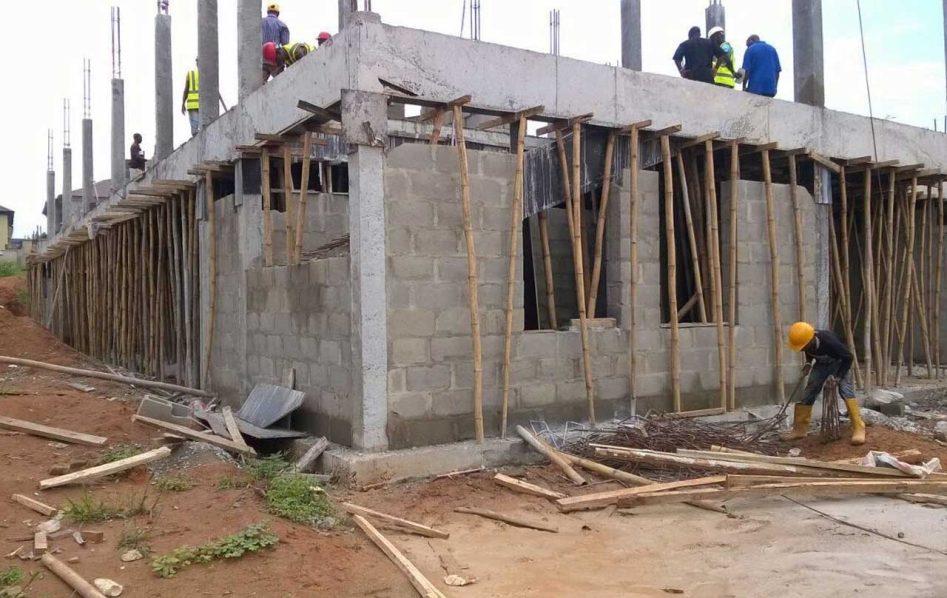These are indeed trying times not only for property developers but the entire construction industry value chain as uncertainties continue to surround getting competent and skilled workforce needed in building production processes.
Statistics revealed that construction workers in the global labour market are over 100 million, constituting about seven per cent of the world labour force.
Nigeria’s construction industry has an estimated market size of between $26.9 billion to $40.3 billion and accounts for nine per cent of Gross Domestic Product (GDP).
With a growing population estimated at over 200 million and housing deficit of 20 million to address the shortfall within the next 20 years, it is estimated that more than 10 million artisans are needed in the market.
Experts say Nigeria needs to train at least one million artisans yearly, to match with the existing shortfall. The construction sector, like clinical science, requires human beings, who are trained to carry out practical works on project sites to bring to reality what has been conceived, designed and to be built.
To deliver quality construction requires high level manpower, the middle level, artisanal level and apprentices or general duty workers, who do not have any artisan’s competency, yet, are helpers on sites.
Regrettably, Nigeria has often engaged the services of such artisans such as masons/bricklayer, iron bender, tillers, Plaster of Paris (POP) installer, electricians, AC repairer, interior decorator, carpenter and plumbers, who could deliver quality projects from neighbouring countries.
According to statistics, Lagos alone has the most active construction site with an estimated 48,000 ongoing projects requiring over 15,000 artisans, while the nation at large needs about 1.5 million artisans per year, which are currently imported.

The Guardian gathered that the imported labour force takes about $4.5 billion to their country yearly. The growing reduction in enrolment by pupils in government technical colleges for the training of the needed manpower is also not helping the industry.
A recent visit to Government Technical College Agidingbi, Lagos, revealed the low level of students/parents’ registration of wards in the specialised school. Hardly can you find 20 pupils registered for some of the craft subjects.
Operatives like contractors and developers rely on foreign artisans from Togo, Ghana, Benin Republic and even Cameroon to work on housing projects. For every building site, hundreds of these artisans are needed, making the industry a potent subsector of the economy to reduce the high unemployment rate estimated to hit 41 per cent this year, according to multinational consulting firm, KPMG in its recently released report for H1 2023.
The President, Association of Building Artisans of Nigeria (ASBAN), Mr. Jimmy Oshinubi, told The Guardian that the main issue is not the shortage of local artisans, but those who make use of them prefer foreign artisans.
He said Nigerian engineers and architects believe that they can do it all alone instead of making use of local artisans, and prefer foreign artisans, who charge lower fees for their services.
“I don’t see any reason why we should be playing the role of big brother all the time at the expense of an average Nigerian. We are getting to the point of what happened in South Africa some years ago, when Nigerians were driven away because they felt jobs that can be done by an average South African are taken over by Nigerians. The same thing happened in Ghana and other African countries.
“An average site engineer believes that artisans are tools for them and forget that artisans are also professionals because no matter how qualified as an engineer or architect, you cannot lay blocks by yourself. But some of them want an artisan that will sleep on site and who will collect a meager fee. That is why they are not patronising us.
“We staged a protest some time ago to say no to foreign artisans, as the development is not helping. We have called on the government, they agreed to train our artisans and after certifying them, yet, they don’t give them jobs. They prefer to give jobs to party loyalists and those who are not even qualified or know anything about construction. That is why collapsed buildings continue almost everywhere in the country,” he said.
Oshinubi said ASBAN plans to prepare a blueprint, which will be submitted to the incoming administration at the federal level on the need to encourage local artisans by giving them jobs rather than turning them to Okada riders.
“We have highly competent, experienced and good artisans in Nigeria, including tilers, bricklayers and others, but the taste for foreign products is driving the construction industry. We must learn to reduce our flair for imported products. Local artisans must be considered in projects as taxpayers,” he added.
Builders say the dearth of skilled artisans and technicians have always been the bane of the construction industry. They lamented that the collapse of technical education has made it difficult to grow the numbers needed to sustain the industry, while the trade schools are now a shadow of what they ought to be.
The Chairman, Council of Registered Builders of Nigeria (CORBON), Dr. Samson Opaluwah, said the dearth of artisans in the industry was as a result of structural failure in the nation’s educational system.
“From pre-independence till the First Republic, Nigeria had a system that produced artisans, tradesmen, technicians and technologists. There were craft centres/schools, technical schools, colleges of technology, polytechnics and in some instances the universities.
“The institutions train every level of manpower needed on the construction site. However, when Nigeria adopted the 6-3-3-4-education system, the technical route, which is from craft school or trade’s centres to technical schools and polytechnics were jettisoned. The technical school collapsed into secondary school.
“Everybody now goes into Junior Secondary School one to three and then, that system felt that at Junior Secondary School three, those who are not academically inclined, will be asked to go into technical schools for their Senior Secondary School one to three. That was where we had the problem.”
He pointed out that the challenge was that at that age, a child is probably about 12 or 13-year-old, adding that he or she does not want to be seen as suboptimal and so, nobody wanted to go into technical education.
“So, the technical section of the secondary school and secondary technical that the 6-3-3-4 system brought up dried up, as there were no products from them. Meanwhile, the craft school has been converted into secondary technical school.
“So, we did not have the production of artisans again because some people from primary school got into craft school and took trade test three, acquired skills and went into the labour market as carpenter, plumbers and bricklayers.
“Some of them after working for some years, went to technical school for three years, took another exam, which is the City and Guilds class two, which qualified them to be a technician. City and guild is a training body in the United Kingdom. Nigeria’s West African Examination Council (WAEC) took over its responsibility,” he said.
According to him, the City & Guilds conduct examinations only on a private basis now. ” We had ordinary technician diploma and higher technician diploma at least up till 1974, we still took ordinary technician diploma, as well as higher technician diploma. When craft schools and trade centres were not getting students’ enrolment, the production of artisans dried up because the moment you move from craft school to technical school, you are going to become a technician and when you move from technical school to polytechnic you have become a technologist.”
He explained that when the situation continued amid the emasculation of the craft school into secondary school, the production of artisan in the formal sector stopped and artisanal training was left to the informal sector, which is not regulated.
He said Nigeria’s neighbours still continued the system of training artisans, which gave them opportunities to produce artisans that Nigeria now imports to meet the needs of its growing construction industry.
Opaluwah disclosed that the National Board for Technical Education (NBTE) has taken a bold step under the Federal Ministry of Education with the approval of Federal Executive Council to establish the National Skills Qualification Framework (NSQF), which has formalised the informal sector and bring it into par with the formal sector to certify both sectors at skill competency level.
“The Federal Government has established the National Skills Council and Sector Skills Council handled by CORBON. That is why we are certifying and licensing people under the N-power programme. The NSQF is used to run the N-power programme of the Federal Government.
‘If that can be entrenched deeply and supported on a massive scale by the Federal Government, it will address skills shortages. I want to see a situation whereby the new administration will not be talking of 50,000 artisans but one million artisans to train per year to address youth unemployment at the rural setting and urban rural drift because construction activities are present in all the nooks and crannies of the country, ” he said.
“The same challenge that we face now, which is everybody acquiring education without skills, is also affecting them. They are looking for people to fill their own gaps. We have only licensed less than 30,000 people under the NSQF, yet we have a huge gap and hope that by the end of May 2023, we would have raised the number to 50,000 people in training,” Opaluwah said.
A past president, Nigerian Institute of Building (NIOB), Mr. Kenneth Nduka, said the challenge of construction artisans is in two folds namely, inadequate capacity, competency and attitude. He observed that many people went into skilled work by accident and not by volition.
“The skilled men in the construction sector today are those who by one reason or the other either failed in their business or there is no job and therefore using it to fill the gap to put food on their table. They are not trained; only want to eke a living,” he said.
Nduka noted that until the intervention of NSQF, there was no structured approach to training artisans for the Nigerian construction industry. “Initially we had the trade test but it became politicised and monetised in a manner that people go to the Federal Ministry of Trade, pay money and are issued certificates. Someone can present a certificate of trade test one but you will discover that the person lacked the skills and competency.
He said some of the foreign artisans use Nigeria’s construction sector as a training ground when they are supposed to do their practical work because the economy is booming with many on-going construction works.
“The patience to do apprenticeship job by most Nigerians is no longer there, everybody want quick money,” he said
To him, the way forward is the NSQF, which was started by the Federal Government in 2014.”In the programme, there are levels and participants are supposed to be assessed to qualify; there are practicals and other components. If the Federal Government and other levels of government emphasised that only those who are qualified are engaged, people will be able to go for the training and qualify.
When people see that they can get qualified skilled artisans in Nigeria, the Chinese don’t need to bring in their people and others will find it unprofitable because of stiffer competition, ” Nduka said.
Source: The Guardian



















